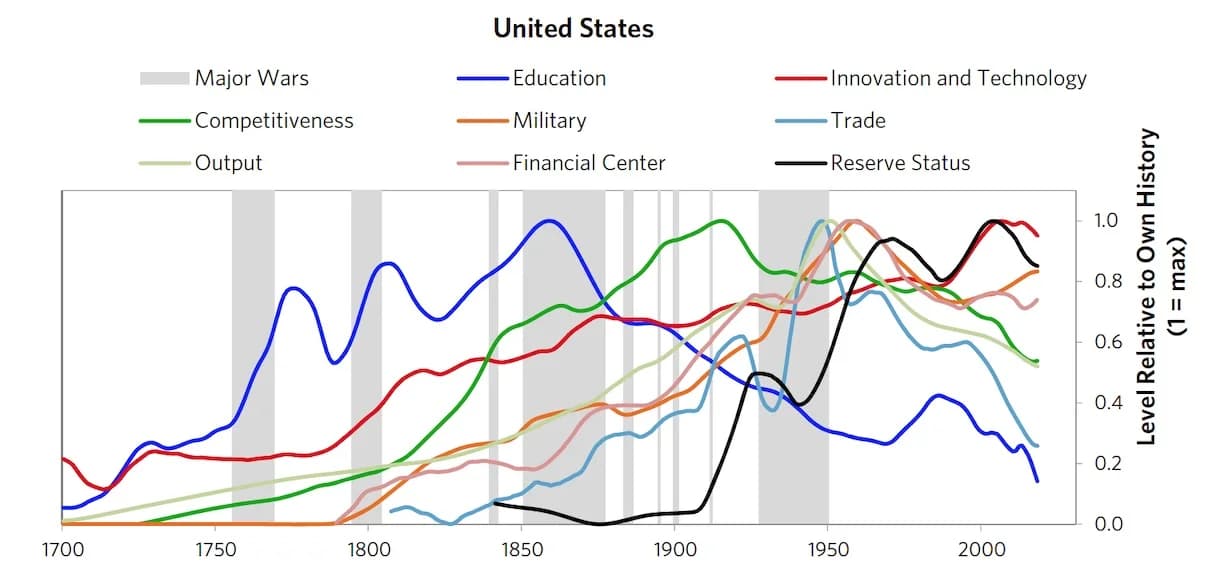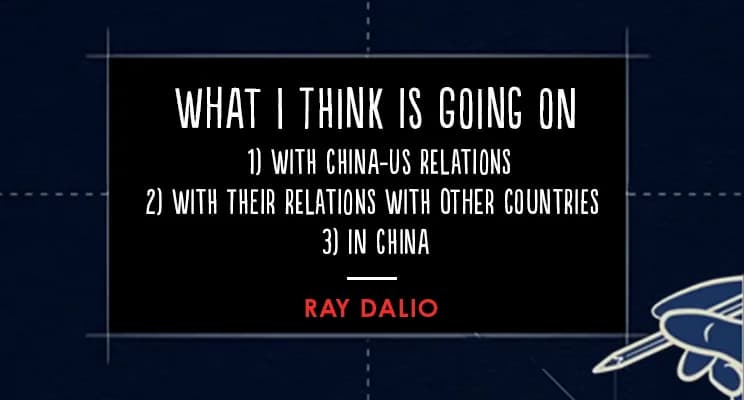What are the most Critical Global challenges facing humankind in the next 50 -100 years? (part 2)
I explore how automation and AI could displace 75 million jobs by 2022—but what happens to workers at 45 or 55 who can't easily retrain, or entire developing nations?
This is the second part of my series about the four most critical global challenges facing humankind in the next 50 - 100 years. In the previous post, I went into more detail about "#1. Climate change / ecological collapse” and "#2. War between civilizations”. Today it will be about "#3. Impact of technology” and “#4. Global inequality”.
3. Impact of technology
Technological innovation across different fields has been hugely beneficial to humankind. It helps to save lives, reduce poverty, make us more effective, improve communication, etc. The combination of machine learning (or AI as a broader concept), automation, genetics, bio-engineering promise to give us many wonderful promises:
- Self-driving cars/ planes
- Better health monitoring and medical diagnosing. There have been a number of proof-of-concept projects, showing us that machine learning can do a better job in X-ray image reading. This enables us to detect cancer more accurately and reduce stress on radiologists, who have a huge workforce gap. Perhaps not too far in the future, each of us will have sensors in our bodies to monitor and alert us of potential diseases.
- Helping teachers with personalized learning curriculum and experience for each student
- A more convenient lifestyle like Smart Assistance on your phone, YouTube video recommendations, direction using Google/Apple Map, etc.
As a whole, according to the World Economic Forum Future of Job report, there is a net positive impact on job creation. They estimate that by 2022, "75 million current job roles may be displaced by the shift in the division of labor between humans, machines, and algorithms, while 133 million new job roles may emerge at the same time.”It is good to see the net 50 million+ jobs being created. However, many of these jobs (if not the majority) will require different/new skillsets.
From the same report, below are the top emerging and declining roles by 2022
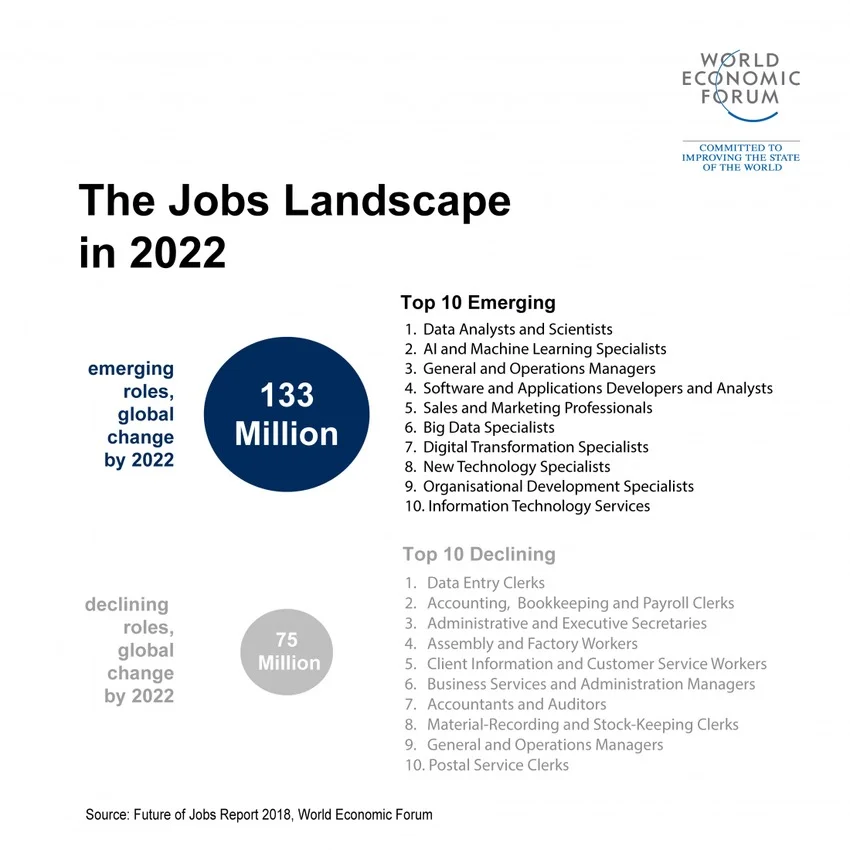
What if right now you are an administrative secretary, or assembly and factory worker, or account/auditor, etc.? If it is true that in less than a few years' time, your role might become redundant, how can you then survive or support your family?
Well, one answer is to become a lifelong learner, to learn new skills, to retrain. This is easier said than done, especially if you are 45 or 55 years old now. It is not easy to be trained to do completely new things.
And this is the best estimate only, no one knows the exact roles which will be negatively impacted.
Now if this is not gloomy enough for you, imagine what will happen to an entire town, community, state or country, whose workforce is not going to be impacted by this change? So far, one of the popular ways for the frontier, developing economies to get modernized is through manufacturing, doing less "value-added" work, which is out-sourced from more advanced economies. This provides capital and opportunities to educate the workforce as the economy advances.
What if in about 5 or 10 years' time, due to advancement in automation, machine learning, digitization, it is becoming cheaper to manufacture most of what we need locally, even in advanced economies? How can many third world and developing countries get the capital and opportunities to develop their economies, their human capital?
Universal basic income (UBI) has been talked about. But it is well known that it has many difficulties like:
- How do we define "universal"? does that mean all communities/states within a country? or global?
- What is considered "basic"?
If we don't have a global solution to this challenge, it will undoubtedly exasperate the next challenge "Global Inequality".
4. Global Inequality
In many countries' Declaration of Independence, we often see phrases like: all men are born equal or all men are created equal, etc. but the truth is that a minority of us born a lot luckier than the majority. Globally, we are Not born equal. Some of us won the lottery at birth and were born in the right countries, communities, families that have given us a far better chance to:
- Survive at birth or until 3 years old. In the Sahel region (in Africa), "a child in Chad is nearly 55 times more likely to die than a child in Finland." data from Bill & Melinda Gates Foundation.
- Receive enough nutrients so that our body and brain can grow and develop fully. In 2016 in Nepal, one in three children were stunted. That was the average but if you were born into a poor family, your chance of being stunted was 50% in the same year.
- Receive the necessary education to be productive when you grow up. From Bill & Melinda Gates foundation again:
- Consider India. In Kollam district in Kerala state, the average person has more than 14 years of education. By comparison, in Budaun district in Uttar Pradesh state, the average person has approximately six years of education.
- In Nigeria, the average person in Ado-Ekiti, in Ekiti state, has more than 12 years of education, whereas the average person in Garki, in Jigawa state, has five.
- In OECD countries, "In 2018, 44% of 25‑34 year‑olds held a tertiary degree, compared to 35% in 2008, on average across OECD countries."
With a healthy body and good education, you have a better chance of getting a good, higher-paying job too.
As for gender inequality, I can't do a better job than what has been written here on the Bill & Melinda Gates Foundation. I include a few key excerpts below:
"Gender inequality cuts across every single country on Earth. No matter where you are born, your life will be harder if you are born a girl. If you are born in a poor country or district, it will be even harder.
Adolescence is when girls’ and boys’ futures really start to diverge. Boys’ worlds expand. They rely less on their parents, venture farther and farther from home, and enroll in high school or college or get a job, which puts them in contact with wider society.
At the same time, girls’ worlds contract. They transition, sometimes at a very young age, from being subservient to their parents to being subservient to their husbands. Although they enjoyed some measure of freedom while attending primary school, they are expected to return to the confines of the home, to devote themselves to cooking, cleaning, and raising children."
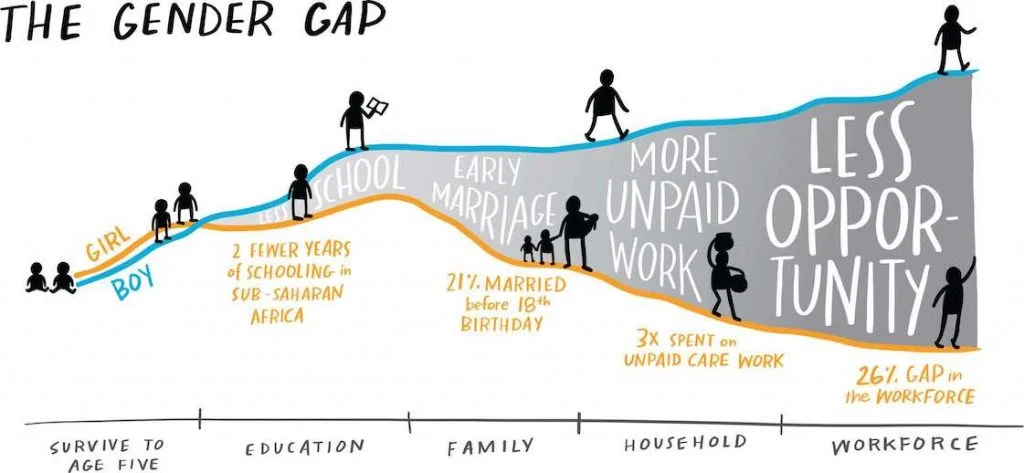
Now if you live in the US and wonder why global inequality is relevant to you while you are dealing with increasing wealth Inequality in the US itself. I empathize with how you feel. The US economy has not worked for the majority of the Americans over the past 40 years.
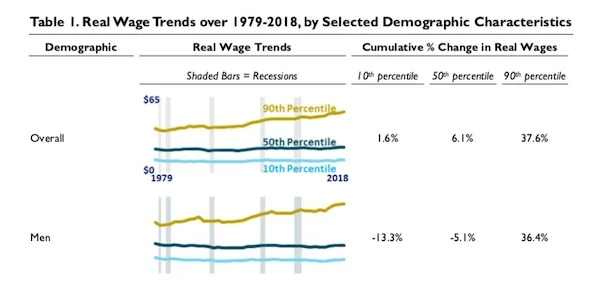
Also, in the next decades, with the demographic boom in Africa, if the various economies are not going strong, we will continue to see millions of people immigrate or try to immigrate to Europe through land or sea.
So what's now? What can be done against these four critical challenges?
"#1. Climate change / ecological collapse”, "#2. War between civilizations”, "#3. Impact of technology” and “#4. Global inequality”
- Focus: There is just too much negative news nowadays and it can make you worried about so many things. While I don't claim that these 4 challenges are the only critical global issues, I think we all can agree that over the next 50-100 years, they are amongst the top. So we should create enough headspace to collectively think, discuss them, rather than chasing after the daily news cycle.
- Care but Be pragmatic: I understand that each of us has so many other personal issues to worry about: from health, personal wealth, our children, happiness, etc. So it is hard to carve out space to worry about issues that are not immediate. So go at your own space and don't judge others.
- Read more: As mentioned up front, I am a student in this subject so I don't pretend that I know the answers to any of the four challenges. I do know that by reading more books, listening to more talks from authoritative figures, it gives me a better understanding and realize how I can contribute.
That's all from me for today.
Cheers,
Chandler

